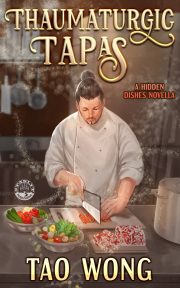Nebula Awards Interview: Christopher Barzak by Charles Tan
 Christopher Barzak is nominated for his novel The Love We Share Without Knowing.
Christopher Barzak is nominated for his novel The Love We Share Without Knowing.
Thanks for agreeing to do the interview. First off, what’s the appeal of speculative fiction for you?
What I love most about speculative fiction is its wealth of ideas, symbols, and metaphorical structures that simply aren’t available if a writer is committed to writing in the realm of strict realism, where only the observable, material world and a sort of consensual social reality must be paid heed to in order to succeed. Realism is more about a writer’s skill at matching whatever reality looks like to a given readership in a given point of time in a given place, whereas speculative fiction, while certainly wanting to get its own worlds made rightly, has the ability to stretch our notions of what is real, to break through to new ideas, if a writer is willing to go there, and new structures, new kinds of stories, new ways of telling of them.
I’ve always written fiction, since I learned how to write as a child. I loved reading, even though my family wasn’t much of a “reading family”. I was addicted to stories from the start: hearing them, seeing them, reading them, telling them, writing them. So I suppose I was a writer before I ever made any conscious decision that I would be. I wrote simply because I enjoyed it. But it was as a late teenager that I felt I had to really consider it as a life path, a vocation of sorts (I like the term vocation, which harkens back to the idea of people having a “calling,” more than I do the term “career”). I grew up in a very working class part of the United States, in a region that was being put out of work more and more each year, each decade, since the 1970s. Practicality and utilitarians reigns supreme in such places, where people are desperate to find a way to support themselves in some way. I felt family pressure to be practical, that if I went to college (and it was not simply expected or assumed in my family that one would automatically go to college), I would study something that had a job at the end of the degree. I went into college as a nursing major, to appease my parents, but I changed my major within the first semester to English and didn’t tell them for a couple of years, until I was halfway done with school, so that I could study what I wanted to, literature and writing, despite knowing it might not get me anywhere in terms of a job after my degree was completed. I’ve always followed my impulses, my intuitions, my desires. They’ve lead me to a happy place in my life, and my family is glad, now, that I went my own way by giving myself over to writing.
Writing The Love We Share Without Knowing was very different from writing One for Sorrow. One for Sorrow was a traditionally told novel, first person perspective throughout the entire, mostly linear storyline. The Love We Share Without Knowing is a novel in stories, and I had to learn how to leap from each story-chapter’s set of characters to a new set while maintaining a sense of forward movement of a larger story that the individual short narratives make up. It’s a collage or mosaic novel form, and because of that, linearity isn’t the point, and neither is plot so much as a sense of connectedness and how those connections are formed. And since the book was a novel all about connection and disconnection, those leaps between various narratives within the greater whole had to be just right, they had to feed into each other the way a plot must be carried from chapter to chapter, like a baton. If One for Sorrow runs on the traditional narrative impetus of “What happens next?” The Love We Share Without Knowing runs on the narrative impetus of “Who happens next? And how will this character fit into the growing overarching narrative?”
My experience in Japan influenced the writing of the novel completely. I wouldn’t have written the book if I hadn’t lived in Japan. I write, more often than not, about where I am. Place is extremely important to me as a writer. Many people begin writing with a plot or a set of characters in mind. I begin with a place in mind, and the characters and the plot grow out of that place, what is unique to that place. I prefer to read stories that feel authentic to their settings. Too often, setting is wallpaper for a story, rather than deep soil in which its characters have grown and been molded by the culture and environment that surrounds them. So being in Japan lead me to write a book set in Japan, and everything I was learning about that country and its various regions was being processed as I wrote this book. In many ways, writing is a way for me to process whatever it is I’m learning or taking in at any given period in my life, whatever it is I’m trying to make some kind of sense of. Being an outsider is a theme of both of my first two books, but in different ways. In One for Sorrow, the narrator is an outsider because he comes from an alienated class of people, and thinks differently both from his own subculture as well as the dominant culture outside of his locale. In The Love We Share Without Knowing, various kinds of alienation is explored: Japanese people who diverge from their own cultural norms, as well as Americans finding themselves in the role of foreigner in another country for the first time in their lives. I find these situations compelling for story because they provide a perspective that does not take reality for granted. What the dominant culture presumes to be true is not always the case, and those who live outside of whatever is deemed “normal” often see into their culture’s more objectively, since they’re on the outside looking in anyway.
In terms of my writing in general, having lived in Japan and returned home later, I’ve grown a sort of third eye about American culture. I can now see it almost as if I’m a foreigner here. I don’t feel as entrenched in it. I acquired some anthropological skills by living in Japan, and coming home I found I could apply that point of view to living in my home country, too. So much of what I’m writing after Japan has been influenced by my experiences there, too.
The most challenging aspect of writing the book was figuring out all of the various character threads, and making them weave in and out of each others stories fluidly, while maintaining a feeling for the reader of wanting to turn the page, the same way one does traditionally when reading for plot. I wanted to make a structure, too, that mimicked those large multi-paned panels Japanese artists have been painting on for ages, depicting epic narratives broken down into individual scenes on each panel, not necessarily linear in nature, but capturing a large story by the placement of smaller pictorial narratives next to each other. These were the most challenging aspects of writing the book, and I think they were also the most rewarding for me, because the structure mirrored the theme of the book, and the movement of the characters within it. It felt all of a piece to me, after I completed it.
A teenager is inherently an outsider, because they’re in transition, unformed, changing quickly from childhood to adulthood. They’ve been given a lot of cultural freedom as a child, because they are children. You often hear people say, “They don’t understand, they’re just children,” and this is often an excuse for breaking some minor cultural prohibition. They haven’t been “cooked” yet, as some Native American tribes referred to the making of an adult person; children are still “raw”. Teenagers have an enormous amount of cultural pressure turned on them at that point in their lives because it’s time for them to get cooked, prepared, ready to be an adult. Those excuses we give children won’t last forever. Expectations are imposed on teenagers, and by examining those expectations that are so evident in the lives of teenagers, who often feel outraged or vaguely upset at having to incorporate some of these expectations that don’t make immediate sense to them, we learn who we are as a culture, or who another culture is, what is important to us. A teenager is encountering these forces not necessarily for the first time in their lives–they’ve probably been exposed to these things in some way as children–but they’re encountering the expectation that they must meet these standards of behavior, values, beliefs, etc, for the first time. The experience can be intense, and can refresh a reader about things they’ve taken for granted. I’m not interested in teenage narrators or characters out of some sense of nostalgia, and I’m not interested in the YA market simply because it’s “the place to be” right now. Those locales are always changing. I’m interested in teen characters because of the fresh and intense perspectives they can provide, if a writer is interested in seeing through the eyes of a character who is going through a major period of molding and shaping.
Juliet Ulman, who was my editor at Bantam, read some of my short stories, and while talking about my short stories with Matt Cheney of the Mumpsimus blog, learned that I had written a novel. She contacted my agent afterward, and the rest of what happened afterward is a fairly standard story. She loved One for Sorrow, made an offer, and after some consideration, I signed on.
Honestly I didn’t really think of anything as challenging. It was just about learning to become a better writer, not necessarily getting published. I wanted to make a good story. The challenge for me as a young writer was to reach a point in my craft where I felt I could make a good story that did what I wanted it to do. After that, selling stories became easier. So the challenge was really about learning my craft as a writer, and in fact I still feel it’s that challenge for me even now. I’m always trying to figure out how to write something the best way, how to learn how to write something differently than I might if I took old, well worn paths.
Editing an anthology has provided me with a more objective perspective as a writer. I understand what an editor is doing better more than I did before this. At least I understand more what an editor who is putting together a collection of stories by multiple authors has to do, that is. I can’t say it’s aided my writing of novels, but it has aided the way I think through the writing of a story that I have aimed at a particular magazine or anthology. I try to gauge what the editor is really attempting to put together, I try to understand their intended audience. I don’t go into writing a short story for a particular magazine or anthology without having considered what it is those magazines and anthologies do.
I’m comfortable with both forms, but I enjoy the more easily attained sense of accomplishment that a short story offers. I also enjoy the space a short story affords a writer to focus on things other than plot. Language, character, different narrative strategies. The short story is a form that is always changing, trying out new things. That’s very exciting to me. I feel like I can play around more in a short story, make faster, cooler leaps. A novel is a larger story. You have to be willing to journey for a long time with them. You come to love and hate them more intensely than you ever will come to love or hate a short story. The emotional responses you might have to a novel you are writing can range all over the place, simply due to the amount of time you are living together with it. Novels are long term commitments. Short stories are whirlwind romances. You get the rush out of the whirlwind, but from the novel you learn how to grow up a bit more, and perhaps more than anything how to be patient.
At the moment I’m working on my third novel, Wonders of the Invisible World, which is set in rural and postindustrial Ohio, as was my first novel, but it moves in time and space to other locales and historical periods, and even into outer space at various points. It’s a longer novel for me than the first two were, and I’m nearing its end, which I hope will be completed by the end of this August. It’s a book that attempts to tell the story of one family over a hundred years of their life as a family and the various forces that might pull at the bonds of family: war, economic collapses, opposing belief systems, unquestioned traditions. It’s a book full of ghosts, mysterious visions, curses, a white stag, and foretellings.
I’m also working on a series of lyric essays/prose poems called Map for a Forgotten Valley, which investigate various sites, experiences, historical personages, and events that are unique to my home region in Ohio. This project largely arose out of my work in my MFA program at Chatham University, a writing program that focuses on place based writing. It’s been a very different kind of writing project for me, and I’m learning a lot from moving outside of the realm of traditional short story or novel making by learning how to write in a different form.
—
Christopher Barzak grew up in rural Ohio, went to university in a decaying post-industrial city in Ohio, and has lived in a Southern California beach town, the capital of Michigan, and in the suburbs of Tokyo, Japan, where he taught English in rural junior high and elementary schools. His stories have appeared in a many venues, including Nerve.com, The Year’s Best Fantasy and Horror, Strange Horizons, Salon Fantastique, Interfictions, Asimov’s, and Lady Churchill’s Rosebud Wristlet. His first novel, One for Sorrow, was published by Bantam Books in Fall of 2007, and won the Crawford Award that same year. He second book, The Love We Share Without Knowing, is a novel in stories set in Japan, and was chosen for the James Tiptree Jr. Award Honor List in 2008. He is the co-editor (with Delia Sherman) of Interfictions 2, and has done Japanese-English translation on Kant: For Eternal Peace, a peace theory book published in Japan for Japanese teens. Currently he lives in Youngstown, Ohio, where he teaches writing at Youngstown State University.
Charles Tan’s fiction has appeared in publications such as The Digest of Philippine Genre Stories and Philippine Speculative Fiction. You can visit his blog, Bibliophile Stalker, the Philippine Speculative Fiction Sampler, or Best Philippine Speculative Fiction 2009.


